
Published: April, 1963
Script: Stan Lee
Art: Jack Kirby
Inks: Steve Ditko
Letters: Art Simek
As our story opens, Reed experiments with meteor energy in hopes of creating a booster fuel powerful enough to help the United States catch up with the Reds in the race to the moon. Sue marvels, “This means America may win the space race!”
This jumped out at me right away, and made me say, “Now wait just one cotton-pickin’ minute there!” I know I was only a kid in the 1960’s, but to the best of my recollection, there was never any doubt that America would beat the Commies to the moon. At least that’s the way it was portrayed by my patriotic teachers, propagandist textbooks, and all the brainwashed grownups I knew. It rattled me to read here that the FF would even consider the possibility that the Commies could outshine the US in anything—never mind something as important as the race to the Moon.
This is not the same world I grew up in.
And of course, the Marvel Universe is NOT the same world I grew up in. So I comfort myself with the the idea that the Commies beating us to the moon might be nothing more than Stan’s attempt to generate a bit of drama for his 12-cent tale. Yeah, that must be it. Right? Sounds like a good explanation to me. I’m going with that.
In hindsight, we know what actually happened in the race to the Moon, but in this story, the FF get to the moon at pretty much the same time as their antagonist, Communist scientist Ivan Kragoff, and his trio of trained apes. Kragoff, a Fantastic-Four-wannabe, has designed his spaceship of “transparent ceramic plastic,” so he and his ape followers can easily absorb the same cosmic rays that imbued the FF with their superpowers.  Well, it works, because as their ship passes through the cosmic belt, Kragoff and the apes are imbued.
Well, it works, because as their ship passes through the cosmic belt, Kragoff and the apes are imbued.
Only, not with the same powers. Kragoff acquires the ability to walk through walls, thus earning him the code name “Red Ghost.” (Red…get it? Ghost….get it?), which is pretty cool, but if you ask me, still one of the lesser superpowers. As for his motley crew, the baboon becomes a shape-shifter, the gorilla super-strong, and the orangutan magnetized.
An aside: in several stories so far, magnetic power has been hailed as a mighty force. But speaking of lesser superpowers, so far I haven’t been that impressed with magnetism in Marvel Comics. I think I’ll wait till Magneto shows up before waxing eloquent on this particular “superpower.”
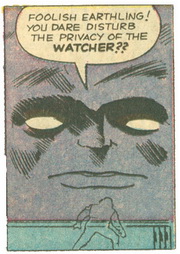 Anyway, they all get to the moon at the same time, and the two parties find not only each other, but an ancient ruined city…and…something stranger still…
Anyway, they all get to the moon at the same time, and the two parties find not only each other, but an ancient ruined city…and…something stranger still…
Enter the Watcher! “The most dramatic being of all time!” (It says so on the cover). The Watcher is from a planet that is “one vast gigantic computer,” a member of a race so evolved they have ceased to strive in all matters of existence and their sole remaining activity is to take notes on other civilizations: thus the name, “Watcher.”
Sensing that the Commies and the good guys are about to devastate planet Earth with acts of savagery, the Watcher decides to break the silence of the centuries to intervene in their conflict. That, and I think he’s also pissed that they’ve brought their quarrel to the Moon, which he considers his domain. (The Watcher has a broad sense of “personal space.”)
But you might never suspect the Watcher’s high level of annoyance because when he speaks, it’s always slowly…quietly…emotionlessly. I guess that’s to show us how detached he is from his surroundings, a being who thrives on cold objectivity. This early Marvel tale comes to us years before Spock of Star Trek, but I sense the same vibe going on here with the Watcher.
To avoid all-out war, the Watcher decides that the FF will have to fight Kragoff and his apes for the fate of the entire Earth. He whisks them off to a secluded combat area on the moon (secluded, because like, we wouldn’t want to disturb anyone else who happened to be moseying 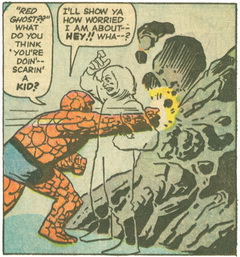 about on the moon), where Thing gets the chance to square off against the apes and their elusive leader.
about on the moon), where Thing gets the chance to square off against the apes and their elusive leader.
I guess little boys (and maybe bigger boys?) like this kind of thing, but I’m going to skip right to the obvious theme of the piece:
COMMIES BAD. “FREE PEOPLE” GOOD.
COMMIES STUPID. “FREE PEOPLE” SMART.
While all the fighting is going on, Kragoff temporarily immobilizes Reed with the stun of a freeze-gun. But once Reed thaws out, he suggests to his teammates that the way to beat the enemy is to “outsmart” them, and from that point on, at every turn, Reed leads the good guys to glory with cleverly devised strategies and devices.
In fact, the story goes out of its way to show us that while Reed employs his American ingenuity to invent things to aid the cause of the “free people,” Kragoff is only capable of discovering and using the leftovers from the ancient 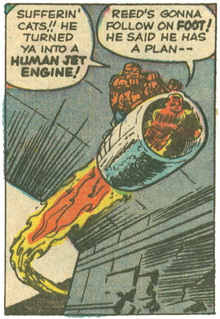 Moon city. While Kragoff fires up a “pneumatic-powered car” he finds laying around, Reed invents a mode of transportation, using Torch as the fuel source.
Moon city. While Kragoff fires up a “pneumatic-powered car” he finds laying around, Reed invents a mode of transportation, using Torch as the fuel source.
Later, Kragoff attacks with a disintegrator gun he discovers on a junkheap, but in the end, it’s the paralysis ray Reed designs that leads to the ultimate defeat of the Red Ghost.
Reed’s resourcefulness is so impressive that at one point, Thing exclaims, “Hey that gizmo you put together really works, chum!” The apes, however, offer no such praise or encouragement to Kragoff. Of course, Kragoff is not deserving of praise or encouragement, because, even though he is a brilliant scientist, among the best the Communist nation has to offer, he is only capable of stealing and using other people’s inventions.
Which leads me to ask: Is Kragoff lazy, or stupid…or both?
FATAL MISTAKE
But worse than that, Kragoff makes a fatal mistake when he assumes that if he keeps the apes hungry and imprisoned, their obedience will increase. Of course, “free people” know this is not true, and when Sue is captured by Kragoff, she reasons that if she can free the apes, she would rather take her chances with them, because they are not intrinsically evil: “They are like the communist masses, innocently enslaved by their evil leaders.”
Wow! That was a significant moment in this story. Once again going back to 1960’s international politics, I remember an overwhelming agreement that ALL Commies are BAD. In grade school, as our thoughts would sometimes wander to the poor little Russian children in their cold, barren schoolrooms, reading their propagandist textbooks, we were encouraged to feel sorry for these children as victims of their own society. Once they got past a certain age, though (we were taught), the menace of Communism would take root in their souls, and no salvation would be possible. So I thought it was pretty big of Stan to separate for his young readers the reality of the communist people from the ideology of the communist party.
The apes are in a cell behind a force field (which Kragoff discovered in the ancient ruined city), and Sue is left on the other side. Kragoff makes yet another fatal mistake when he assumes that the “helpless female” is not going to be resourceful enough to throw a monkeywrench into his plans (pun intended). But of course she does, quickly discovering a control panel in the wall that breaks the force field. YOU GO, GIRL!
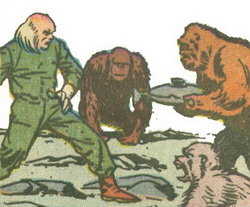 Now that the apes are “no longer under the Red Ghost’s mental control, they want their FREEDOM!” So they bust down the door and grab all the food, and we don’t see Moe, Larry and Curly again until the end of the story, when they attack Kragoff with Reed’s paralysis ray gun and their eyes “gleaming with hatred.”
Now that the apes are “no longer under the Red Ghost’s mental control, they want their FREEDOM!” So they bust down the door and grab all the food, and we don’t see Moe, Larry and Curly again until the end of the story, when they attack Kragoff with Reed’s paralysis ray gun and their eyes “gleaming with hatred.”
In addition to underestimating the power of a “free woman,” it is Commie Kragoff’s lazy stupid ways that ultimately cause his downfall. He doesn’t fully understand the technology he swipes, so he doesn’t recognize the weak spots. Because he uses a force field he discovered (not created), he’s not aware how easy it is for Sue to disable it. Because he uses a disintegrator gun he discovered (not invented), he doesn’t realize it will have no effect on Sue when she is invisible. And because of this, Sue is able to rescue the others so they can deal with Kragoff.
It’s not surpising that when Kragoff sneaks into the Watcher’s house, everything there is beyond his understanding (“It’s too alien—too different! I—I don’t even know what I’m looking at!”). Funny, but somehow I bet Reed would know what he was looking at, and be fascinated.
THE WATCHER
But what of the Watcher? He’s an oddity in the Marvel Universe, not a superhero, not a villain, just an entity that is there, passively observing. Can we say, perhaps, he is the “voice of reason”?
Russ assures me we will see the Watcher again. Right now, I’m not sure what use he is, if all he’s going to do is WATCH. Kind of reminds me of those annoying Star Trek episodes where Kirk 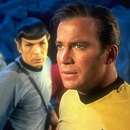 (or Picard) is constantly moaning about the Prime Directive and how it would be wrong to interfere and help all those needy people on some underdeveloped planet. Sorry, but I don’t have any patience with the Prime Directive—which, btw, the Enterprise crew probably ignored more often than not. But don’t get me started on THAT!!
(or Picard) is constantly moaning about the Prime Directive and how it would be wrong to interfere and help all those needy people on some underdeveloped planet. Sorry, but I don’t have any patience with the Prime Directive—which, btw, the Enterprise crew probably ignored more often than not. But don’t get me started on THAT!!
Anyway, all’s well that ends well, as Kragoff is attacked by his disgruntled apes and the Watcher declares the Four the winner of the contest, proclaiming, “Space is your heritage! See that you prove worthy of such a glorious heritage!” Well, we know the “free people” will prove worthy, and thus we are bound to have many more adventures on the moon, and other planets, as we continue to explore new frontiers here in the Marvelous Zone.
![]() In fact, next time, we’ll explore several frontiers, on land and sea, even touching mythical kingdoms, as my usually bland Meanwhile… post expands to examine the adventures of superheroes who remain vital, despite the fact that they don’t even have their own title!
In fact, next time, we’ll explore several frontiers, on land and sea, even touching mythical kingdoms, as my usually bland Meanwhile… post expands to examine the adventures of superheroes who remain vital, despite the fact that they don’t even have their own title!
| Want to read this comic on your computer? Marvel has a scan! Want to own this story? Buy the Masterworks! |














